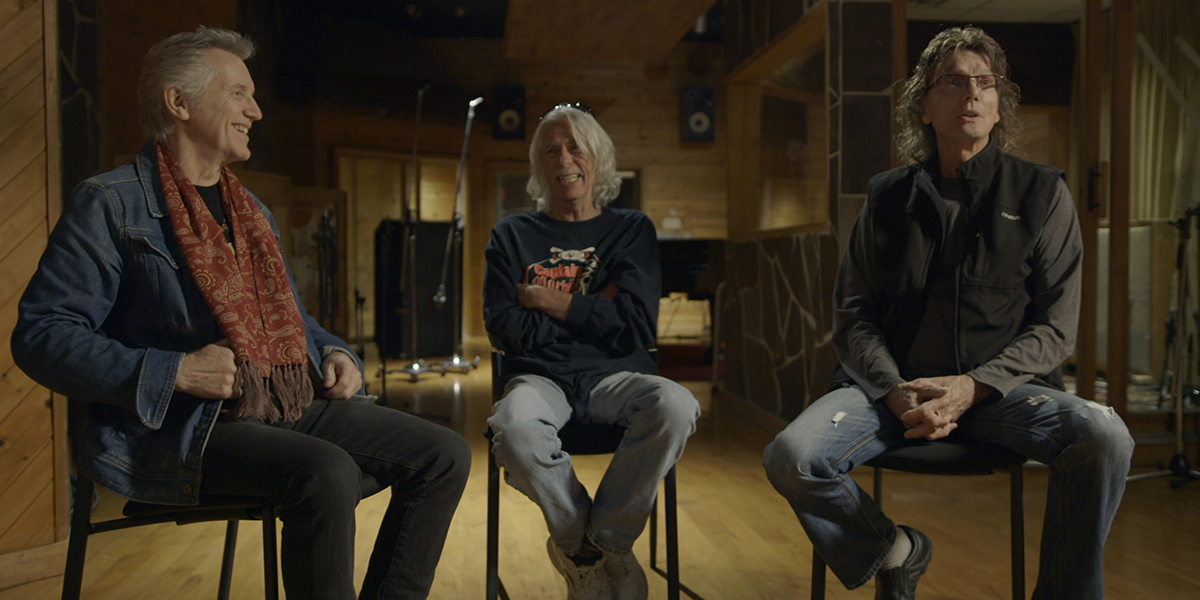Triumph: Rock & Roll Machine
(Canada, 97 min.)
Dir. Sam Dunn, Marc Ricciardelli
Programme: Special Events
Triumph: Rock & Roll Machine is loud, fun, super positive and a bit slight, which is not dissimilar to the band it documents. Tracing the counters of just about every other generic rockumentary, mixing interviews with the band, archival footage, and ecstatic and emotional responses from the fans, it does exactly what it needs to do to sate viewers who are already aboard and to gain a few new listeners along the way.
Formed in Toronto in 1975 and having hits right through the mid-1980s, Triumph quickly established themselves as, to paraphrase the words of Spinal Tap, one of the world’s loudest bands. Bringing in pyro explosions and giant amplifiers to high school dances wasn’t common then (and impossible to imagine now!), but their drive and ambition to dress the part of a stadium well before they had any right to be considered that successful is but one part of the band’s charms.
Triumph emerged out of previous group that was preposterously named Abernathy Shagnaster, a progrock-ish outfit that had some minor local success in and around the Toronto area. That band’s drummer/singer/equipment maven Gil Moore and business-minded bass player Mike Levine spotted a young virtuoso guitarist/singer named Rick Emmett.
The three would go on mix their love of heavy yet melodic songs to create some indelible tracks that will still be blared from car stereos on any warm Canadian night. With numerous gold and platinum records under their belt, and festival concerts playing to hundreds of thousands of people, they were at the time considered the premium power trio by many, rivalling the success of fellow local power-trio Rush.
Director Sam Dunn, a fellow Torontonian who previously helmed the highly influential Metal: A Headbanger’s Journey, is joined by Marc Ricciardelli to craft this tale of perseverance and positivity. Like Dunn’s Grammy award-nominated Rush: Beyond the Lighted Stage from 2010, Rock & Roll Machine spends much of its time with the fans, a particular subset of middle-aged rockers whose lives were greatly shaped by their musical choices from the late-70s to the mid-80s.
There are plenty of rote but nonetheless moving tales of how a certain song or connection with the band helped a person through a particularly traumatic time in their lives, and the film serves in many ways as a celebration of the tenacity of fans who never lost the faith in Triumph. The structure leads to a reunion of the trio at Metal Works, the famed recording studio that was birthed by the band’s success and has been run by Moore for many years, the home to recording by everyone from Bowie and Prince though to contemporary local superstars like Drake and The Weeknd.
Years later, Emmett’s falsetto is long gone, yet the three members triumphantly work through a setlist to an intimate group of fans, and even the most cynical can’t help but be swayed by their obvious enthusiasm. Like Triumph itself, the film doesn’t break any particularly new grounds, and feels as close to middle-of-the-road as hard music ever got. It doesn’t have the theatricality of a Kiss, the anger of what came out afterwards with the children of Metallica, or even the gothic pretense of what came before from likes of Iron Maiden, Led Zeppelin, or Black Sabbath. Yet there’s no doubting the melodic elements that drove them to radio stardom, and perhaps Guns ‘N Roses would be a more obvious child of their music, even if that came within the context of Lycra leotard libidinous rock that truly came out from their contemporaries, Van Halen.
Whatever the result, Triumph’s popularity has shrunk over the years, but its impact is certainly worth documenting. While the film eschews any forms of deep controversy or even critical analysis and feels more an add-on to a retrospective box set than a probing or provocative rock-doc, there’s a great deal of affability in their connections, good archive footage, and warm reminiscences that it’s sure to please those who will seek it out.
After all these years, it’s nice to remember what rocked, and nicer to see that much of what gave them success holds up to scrutiny. This is a band that wanted to be big right from the start, and as a tale of hubris that resulted in enormous success it’s fun to go along for the ride.
Triumph: Rock & Roll Machine may not benefit from comparison to some of the more extraordinary music films that have come out recently, but its ambitions are certainly more straightforward than trying to rewrite the game. The machine may churn on, but for many things were simply never better than hearing the likes of “Hold On” blaring out your car stereo as you rode down the highway, convinced that there was more in front of you than behind.
Triumph: Rock & Roll Machine premiered at the 2021 Toronto International Film Festival.













